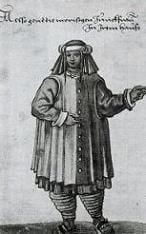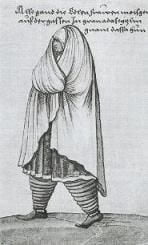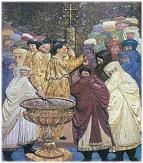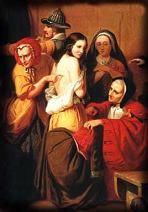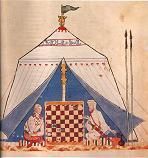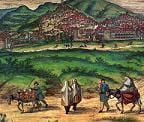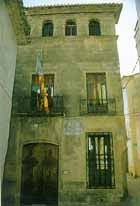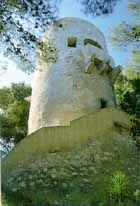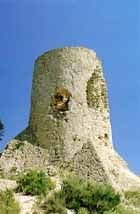Piracy was one of the most serious problems he had to face this part of the coast. great economic efforts to build fortifications, towers and castles on the coast were made. The piratical dangers were relieved at times by four galleys which chartered the Count of Lerma, Don Francisco de Sandoval. Such galleys, (after the expulsion of the Moriscos) in addition to saving the coast, made many trips transporting Islamized North Africa, which emerged from Javea about eight thousand.
King Philip III of Castile and II of Valencia gave the place Xàbia-Jávea the title of Villa in 1.612, a fact which meant some recognition of the importance of this place and its 1.800 inhabitants, inhabitants of the four hundred fifty houses that existed within the walls. Supports this idea, installation in the villa of a Franciscan convent in 1.616, who built his house on the place known as Placeta del Convent.
The most notable families in Xàbia-Jávea as Bañuls (1944), Sapena, Bas (1640), Trilles (1633) obtained two separate cavalry privileges and titles of nobility in the seventeenth century. This moment are some buildings in the town. The most representative case is perhaps the current Municipal Museum.
Under Charles II, Navy was full of gangsters, who had terrorized the people of the region, many of them abandoned their criminal life when passed to serve the king's armies on the Italian peninsula.
In 1.681 the marquis of Dénia granted Xàbia-Jávea the right to be able to demand tolls, hunting, herbage, etc ..., so that the place will be reimbursed from the expenses incurred in the fortification of the place.
Given the importance of trade and expansion possibilities in 1687 he had started making on the coast of Xàbia, attempt that was aborted by the colonial authorities, although they could embark and disembark goods dock.
During the seventeenth century, important disputes continued with neighboring Dénia due to disputes over the respective municipal terms. As a result of a favorable ruling, Jávea-Xàbia incorporated the San Bartolomé valley, while Jesús Pobre continued under the administration of Dénia.
The kick of the Moorish
Source: Andrés Ortolá Thomas (1.999)
The expulsion of the Moors, that is, of the Muslim minority that lived in Spain as a legacy of Arab Spain, constitutes one of the capital themes of our history. The religious tolerance that had characterized the Middle Ages, expressed by Mozarabism and Mudejarism, was replaced, with the advent of modern times, by the assimilating tendency of the Catholic Monarchs and the first Austria. When assimilation failed, the idea of expulsion, decreed by Philip III in 1609, gained shape. Spain took advantage of the pacifist conjuncture of Western Europe-the peace of London in 1604, truce with the Dutch in 1609-to concentrate its fleets in the Mediterranean and resolve a crucial aspect of its internal unity with the massive expulsion of the Moors.
With the exception of Messrs affected in their properties, the rough measure of Felipe III was met with general applause. The April 4 1609, Felipe III held in the Alcazar of Segovia, signed the terrible decree had to erase from the face of Spain, thousands of dedicated mostly to the cultivation of land settlers. The expulsion decree. Actually, it was modeled on the Catholic Monarchs against Jews in 1492 and, like that, is catered exclusively to religion and not race.
He cared little Philip III the political question. Heavily influenced by the Duke of Lerma and his confessor Fray Gaspar de Córdoba and once edged the religious question. In his indolence he left the government completely abandoned in the hands of the Duke of Lerma and Marques de Denia. will not alarm the fear of a rebellion of the Moors, made with threatening the Archbishop Ribera, because the proportion of Christians with the Moriscos was quite reassuring. In the 1599 census, there were in the Kingdom of Valencia 28.071 73.721 moriscas Christian families. Industriousness, sobriety, frugality in their treatment, no luxuries they had in their home and dresses, and the eagerness in which despite the taxes they paid went to cleave money and being provided a more advantageous position than many old Christians, the speed with which multiplied by not admitting including celibacy and marry very young, the not contribute to service weapons, which were exempted, without losing people in the costly wars then kept Spain, the not to emigrate in search of wealth to the new world, all this made the Moriscos multiply with extraordinary rapidity.
Such was the Moorish population growth, which in the early seventeenth century and at the request of the Parliament of the Kingdom formation censuses not to reveal the Moriscos force that had been suspended. The situation was becoming untenable. The ambition of the Duke of Lerma, who won for themselves and their children, of the party appropriated the sales of the houses of the Moors the amount of 500.000 ducats. Covetous minister was used to exploit the great political measures to their advantage. The 23 day of September 1609 in the streets and squares of Valencia, the pragmatics of expulsion trumpeted, in which the king apellidando heretics, apostates and traitors to the Moriscos, said using clemency, did not condemn them to death, or confiscating their property, provided they hasten to be shipped in within three days and quit forever the lands of Spain.
In that short three-day period, the Moors and their wives, on pain of death, should be directed to ports that each commissioner señalase them. They were not allowed out of their homes rather than goods that could carry on their bodies. It is authorized to anyone who finds a moorish rampaging out of their past three days instead of the edict, to take what you take, seize and kill him if he resisted. Imagine the surprise that caused the Moriscos in this terrible side. They were forced to leave the land where they were born, they and their ancestors, land that had watered with the sweat of brow and had fertilized with their industry.
The greatest danger for the Moriscos was to reach the seaports, the old Christians were willing to take revenge and attracted by the love of pillage, they formed gangs on the roads, which assaulted, robbed and murdered the unfortunate Moors. Soldiers and countrymen rivaled in greed and cruelty. Many gentlemen had to accompany their vassals to the sea. The Duke of Maqueda took his generosity to go with his vassals of Aspe and Crevillente and leave them in Oran. Many of the families, believing themselves to be safer, had chartered for themselves ships to be moved to Africa, victims of the greed and brutality of their bosses perished on the way. They were stolen and beheaded during the crossing and thrown into the sea.
In the exile of the Moriscos the scenes of bitterness of the expulsion of the Jews in the XV century were repeated. Those sentenced were to continue living in their places. What sadness in the last days of stay in the lot of the ancestors, without cultivating the orchards that had to happen to strange hands! until the commissioner who was to lead the unfortunate caravan to the port where the king's galleys awaited.
From a moral perspective the expulsion of the Moriscos was an act of barbarism and religious and political intransigence. Approximately 112.000 people (more than 42.000 from the ports of Denia and Javea) were expelled from their country for the simple reason that they were different: they spoke another language, had other customs and worshiped the same God in different ways. The Moors expelled or killed 127.000 represented 30% of the population of Valencia. The population loss was terrible and the repopulation took about a century to partially fill that void. In the economic order was deprived the nation of the most useful population, producer and taxpayer. The transportation cost of the Moors to Africa, 800.000 ducats. Moreover, the Moriscos put into circulation lot of false currency that affect trade and public finance. Fields were uncultivated. Territorial lords lost many of their incomes. Feudal fortresses were demolished and their owners, who could not defend the lack of vassals, concentrated in cities. The lack of arms industry was ruined by closing factories and workshops. Moriscos expelled produced another kind of evil to Spain more baleful than those intended to prevent the expulsion, evils that covered their costs of mourning and desolation for many years. Moriscos animated the deepest hatred against the Spaniards, many of them dedicated to exercise piracy spreading terror on our shores.
The attacks suffered by the Calpins in 1637 and 1744 are good proof of this. The last Moors of the Navy (mostly children and possibly orphans from the battle of the Vall de Laguar) were baptized in the church of San Pere de Benissa on October 28, 1610. Benissa counted in 1609, according to the census of Francisco de Miranda , with 210 houses of old Christians and 30 of Moors. In Calpe, the few Moors that there were lived in the Coma de la Morería (House of Culture) the rest were scattered in the different farmhouses of La Cometa, Toix, Enchinent, etc. The Moors hastily sold all the goods that they could not take with them, causing a sharp drop in prices due to an excess supply This circumstance led to the that a few foreign landowners took over the best lands in Calpe.
Tomas Andrés Ortolá 1999
January 07 from 2013 - 18: 11

